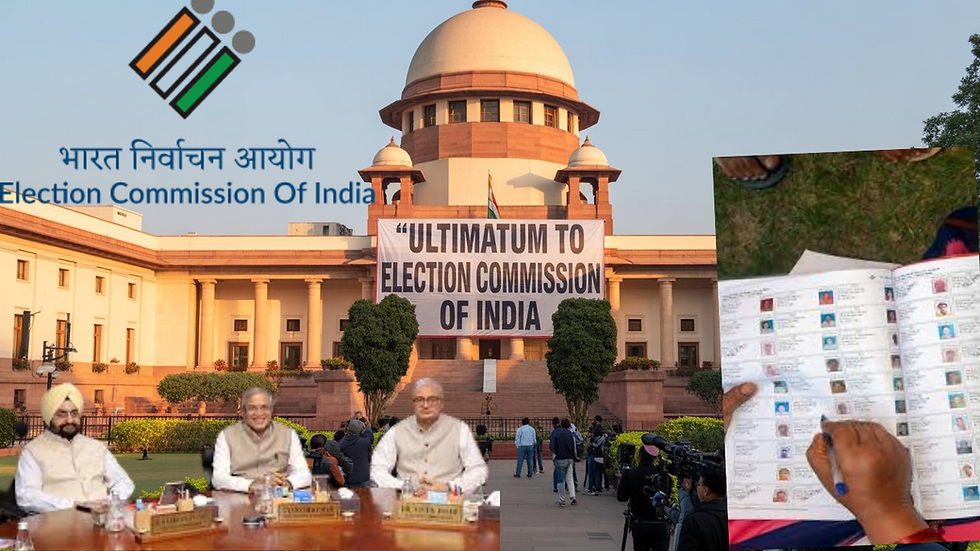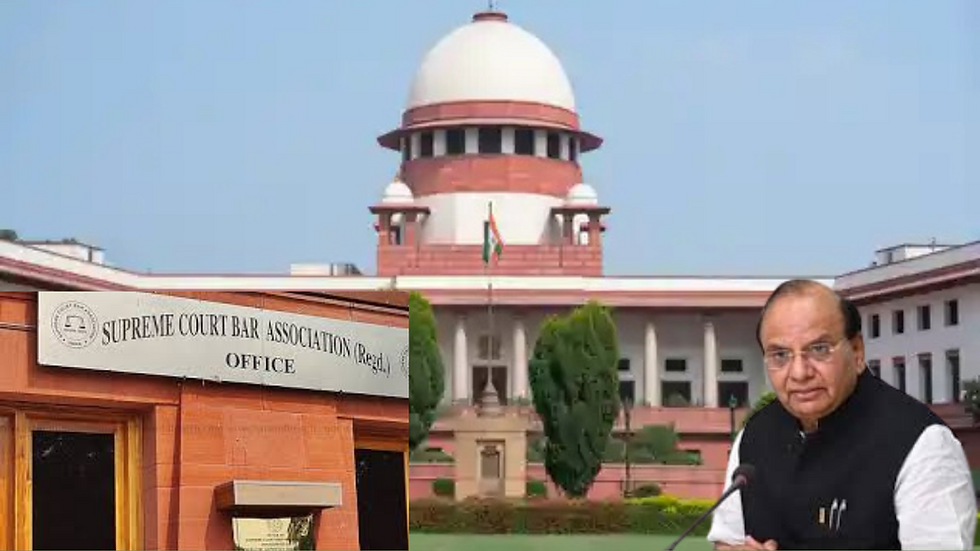The Election Commission of India (ECI) has assured the Supreme Court that it is taking every possible step to ensure that no eligible voter is left out of the electoral roll during the ongoing Special
- JainSir Classes
- Aug 23
- 5 min read
The Election Commission assured the Supreme Court, stating, “We ensure that not one voter will fall through the cracks,” while seeking more time to complete the process during the hearing on Bihar’s special intensive revision of electoral rolls.

New Delhi: The Election Commission of India (ECI) requested the Supreme Court on Friday to have faith in its ability to conduct the special intensive revision (SIR) of electoral rolls in Bihar, emphasizing that “not one voter will fall through the cracks.”
A bench comprising Justices Surya Kant and Joymalya Bagchi, which was reviewing several petitions challenging the ECI’s decision made on June 24 to proceed with the SIR, permitted excluded voters to submit their claims either online or in person.
The court stressed that the entire process should be user-friendly for voters.
Claim forms can now be submitted by excluded voters along with their Aadhaar card number or any of the 11 specified documents related to the SIR.
Senior advocate Rakesh Dwivedi, representing the ECI, noted that no political parties have raised objections regarding the exclusion of 65 lakh voters from the draft list published on August 1.
He urged the court to grant the ECI a 15-day period to demonstrate that no voters have been left out, stating,
“Give us some time, we will ensure that not one voter will fall through the cracks.”
Dwivedi remarked that political parties were making a fuss about the situation, asserting that, “things are not bad.”
He asked the court to trust the ECI and allow more time to prove that there are no exclusions. The ECI reported that around 85,000 individual voters who were excluded had submitted their claim forms, and over 2 lakh new voters had registered during the SIR process in Bihar.
The bench expressed surprise that voters were coming forward individually and questioned the political parties’ inaction.
Urging political parties to assist voters in submitting their forms, they asked,
“What are the booth level agents doing then? Why the distance between political workers and the local people?”
Dwivedi criticized the political parties for “whipping up fear among the voters for political interest.” He explained that the electoral process is for elections, and while some party will win and form a government, political parties should also address the ECI’s mistakes rather than merely protesting.
The chief election commissioner had recently called on all political parties to collaborate with the commission in this effort.
The ECI clarified that it was not requiring political parties to appoint a specific number of agents, allowing them to make as many appointments as necessary. Dwivedi stated that if each booth level agent (BLA) verifies at least 10 names of the 65 lakh excluded voters, the 1.60 lakh registered BLAs could verify 16 lakh voters in a single day. In four to five days, the entire group of excluded voters could be verified.
He assured the bench that all electoral registration officers had been instructed not to remove any names from the draft roll without conducting an inquiry or giving voters a chance to be heard.
He added,
“We don’t want to exclude anyone. Individuals can themselves come forward with any claim or objections,”
Expressing surprise at the lack of political party involvement in helping excluded voters file objections, the Supreme Court directed the chief electoral officer of Bihar to include them in the court proceedings.
The Court laid down several directions in the matter.
First, it directed the Bihar Chief Electoral Officer to issue notices to the Presidents, Working Presidents or General Secretaries of all recognised political parties, requiring their representation in Court along with status reports.
Second, it clarified that every person is entitled to apply online for inclusion in the voter list, either independently or with the help of Booth Level Agents (BLAs), and that physical submission of forms is not compulsory.
Third, it ordered BLAs of all political parties to actively assist nearly 65 lakh individuals who are missing from the draft rolls, excluding those listed as deceased or who have voluntarily migrated in filing objections before the cut-off date of September 1.
Fourth, it directed that where physical forms are submitted, Booth Level Officers (BLOs) must provide acknowledgment receipts, though such receipts will not by themselves establish that the form is complete.
On the issue of receipts, the Court further clarified that the Election Commission “may consider the desirability of uploading them on its website to prevent future disputes.“
Senior Advocate Kapil Sibal, representing RJD MP Manoj Jha, requested an extension of time, but the Bench declined at this stage.
Justice Kant remarked,
“Today we are not extending. But if there is overwhelming response, we will consider,”
The bench ordered all political parties to submit a status report by the next hearing regarding the assistance they provided in filing claims for excluded voters, scheduling the next session for September 8.
It instructed recognized political parties to direct the over 1.60 lakh registered BLAs to facilitate the completion of claim forms for the 65 lakh excluded voters, except for those deceased or who have voluntarily migrated to other constituencies.
The top Court instructed the Election Commission to permit excluded voters to submit their claims either online or in person, using their Aadhaar card or any one of the 11 specified documents as part of the Special Intensive Revision (SIR) of electoral rolls in Bihar, which is preparing for elections.
The bench clarified that, for now, the deadline will not be extended. It stated that it is only reviewing the overwhelming response received and, if required, it may reconsider the issue on the next hearing date.
Advocate Prashant Bhushan, appearing for the NGO Association for Democratic Reforms, pointed out that many individuals are employed as migrant workers outside the state, which could prevent them from physically submitting the forms.
Earlier, On August 6, the Court learned that 6.5 million names were removed from the draft electoral roll published on August 1. The ECI assured the Court that no names would be removed without prior notice, an opportunity for a hearing, and a reasoned order from the appropriate authority.
The Election Commission of India (ECI), On 24 June 2025, started a Special Intensive Revision (SIR) of the electoral rolls in Bihar before the Assembly elections. Under this process, voters were asked to provide updated documents, but many citizens did not have them.
Opposition parties and several NGOs criticised this move, saying it could deprive a large number of genuine voters of their right to vote. They approached the Supreme Court (SC), calling the ECI’s action arbitrary and against the Constitution.
The Commission, On 1 August 2025, released the draft electoral roll, which showed a total of 7.24 crore registered voters. At the same time, around 65 lakh names were removed from the list.
Petitioners, including the Association for Democratic Reforms (ADR), requested the Supreme Court to order the ECI to make public the full list of voters whose names were dropped, along with the reasons for each deletion. They said that without such transparency, many citizens might lose their right to vote without being given a fair chance to object.
Case Title: ASSOCIATION FOR DEMOCRATIC REFORMS AND ORS. Versus ELECTION COMMISSION OF INDIA, W.P.(C) No. 640/2025 (and connected cases)



Comments